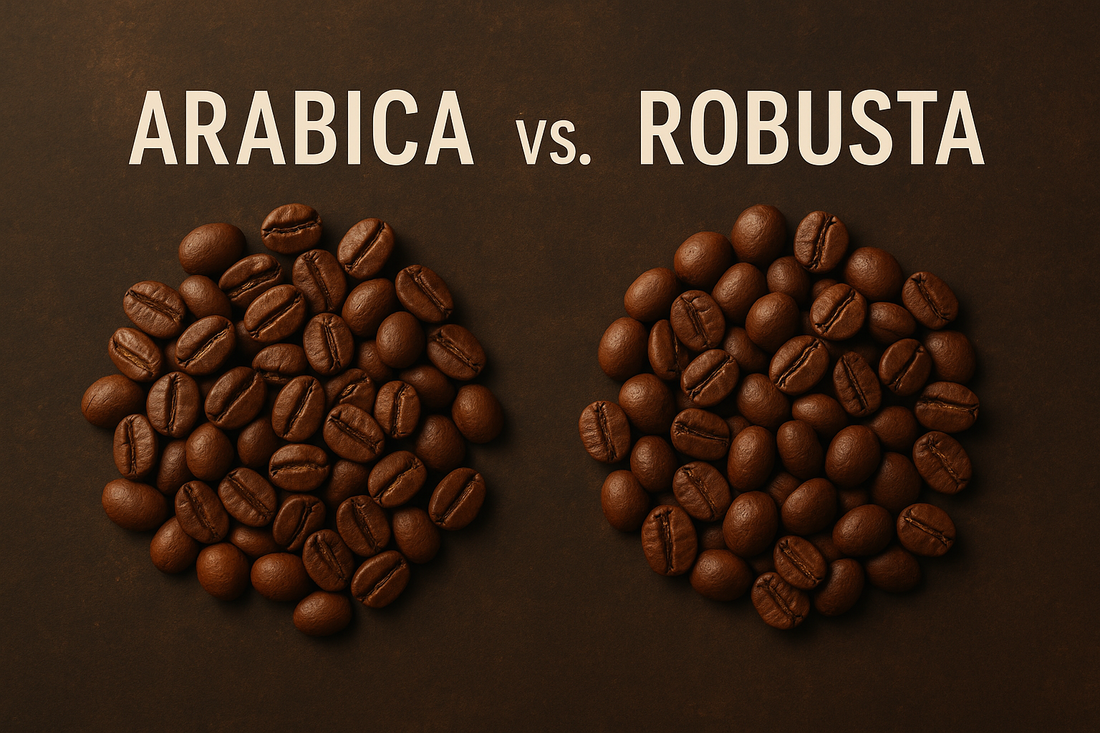
Arabica vs. Robusta: Discovering the True Spirit of Coffee
Share
Coffee is more than a drink — it’s a ritual, a source of comfort, and a symbol of craftsmanship. Yet behind every cup lies a simple truth: not all coffee beans are created equal. The world’s two dominant species, Arabica (Coffea arabica) and Robusta (Coffea canephora), differ in nearly every way — from their growing conditions to their taste, aroma, and even their effect on your health. Understanding these differences helps every coffee lover appreciate the true spirit of quality coffee.
1. Origins and Cultivation
Arabica coffee has its roots in the highlands of Ethiopia, often called the birthplace of coffee. These beans thrive in cooler climates and higher altitudes (1,000–2,000 meters above sea level), where they mature slowly, developing complex sugars and delicate flavour compounds. The plants are fragile, sensitive to pests and temperature fluctuations, and require careful hand-picking and processing — all of which contribute to Arabica’s rarity and premium value.
Robusta, by contrast, originates from Central and Western Africa. It grows in lower altitudes and warmer climates, and its name says it all — “robust.” The plant is much more resilient, resistant to pests, and yields a higher crop with less effort. However, this hardiness comes at a cost: Robusta beans develop fewer natural sugars and aromatic oils, resulting in a more intense, sometimes harsh flavour profile.
2. Taste and Aroma
The most noticeable difference between Arabica and Robusta is in the cup. Arabica coffee is renowned for its smooth, layered, and nuanced taste. Depending on the region, it can reveal hints of berries, chocolate, caramel, citrus, or even floral notes. Each origin tells a story — from the soft sweetness of Brazilian Arabica to the bright acidity of Ethiopian or Guatemalan varieties.
Robusta, on the other hand, produces a bolder but more bitter taste, often described as earthy, woody, or even rubbery. Its higher caffeine content gives it a sharp edge, and its body tends to be heavier but less refined. While some espresso blends use small amounts of Robusta for crema and strength, pure Robusta lacks the elegant depth and clean finish that true coffee connoisseurs seek.
3. Caffeine Content and Its Effects
Caffeine is what gives coffee its stimulating power — but more isn’t always better. Robusta contains 2–2.7% caffeine, nearly double that of Arabica’s 1–1.5%. This explains why Robusta tastes more bitter and has a stronger impact on the nervous system.
While caffeine in moderation can improve focus and mood, excessive amounts can increase heart rate, raise blood pressure, and cause jitteriness or insomnia. For those who drink several cups a day, Arabica offers a smoother experience with less acidity and a gentler caffeine release, making it both enjoyable and easier on the stomach.
4. Bean Quality and Processing
Arabica beans have a more oval shape with a curved crease, while Robusta beans are rounder and smaller. But the real difference lies in the post-harvest treatment. Premium Arabica beans are typically wet-processed (washed) — a method that enhances clarity, brightness, and flavour definition. Robusta is often dry-processed, which is cheaper but less precise, leading to uneven flavours and rougher textures.
The extra care in cultivating and processing Arabica ensures a cleaner, more consistent cup, which is why it dominates over 60% of the global coffee market and is the preferred choice for specialty roasters worldwide.
5. Health and Enjoyment
Because of its smoother taste and lower caffeine content, Arabica coffee is often gentler on the digestive system and less likely to cause acidity or discomfort. Its higher content of natural antioxidants and essential oils also adds subtle health benefits, supporting mood balance and general well-being when enjoyed in moderation.
Robusta’s high caffeine and chlorogenic acid levels can make it harder on sensitive stomachs. While it provides a strong energy boost, it’s often seen as the more utilitarian choice — used for instant coffees and mass-market blends rather than gourmet experiences.
6. The Choice of True Quality
At Coffee Spirit Premium, we believe that coffee should be more than strong — it should be refined, balanced, and crafted with care. That’s why coffeespirit.uk proudly offers only premium, 100% Arabica beans, sourced from the world’s finest single-origin farms.
Each batch we select embodies the passion and precision that make Arabica the heart of exceptional coffee. From the careful cultivation of the plants to the art of roasting and brewing, every step is designed to preserve its authentic aroma and smooth, elegant flavour.
When you choose Arabica, you choose depth, complexity, and true craftsmanship.
That is why Coffee Spirit stands for quality, purity, and the genuine spirit of coffee.
1 comment
We need to improve our culture of drinking Coffee…